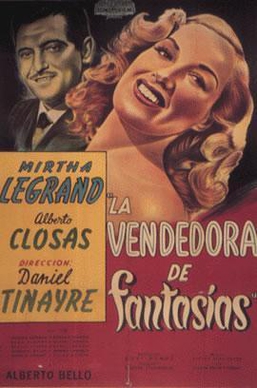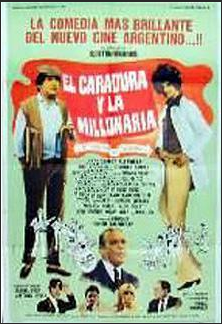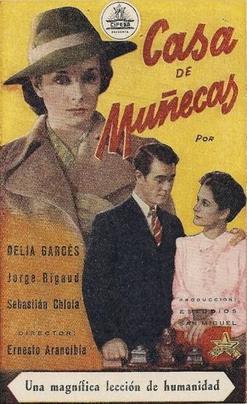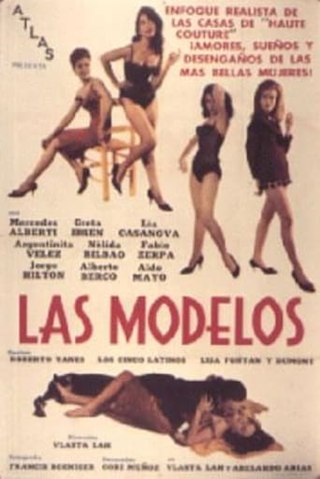
The Newsie and the Lady is a 1938 Argentine comedy film directed and written by Luis César Amadori.

Elvira Fernández, vendedora de tiendas is a 1942 Argentine comedy film directed by Manuel Romero. It stars Paulina Singerman, Juan Carlos Thorry, Tito Lusiardo and Sofía Bozán. The film is about the daughter of a millionaire store owner, who organizes a worker strike.

Cita en las estrellas is a 1949 Argentine fantasy screwball comedy film directed by Carlos Schlieper, and starring María Duval and Juan Carlos Thorry. It was produced by Kurt Land and released by film studio Emelco. Set in Mar del Plata, the film tells the story of two lovers that are separated by death, and their desperate attempts to reunite in Heaven. The screenplay was written by Alejandro Verbitzky and Emilio Villalba Welsh.

La Vendedora de fantasías is a 1950 Argentine crime comedy film directed by Daniel Tinayre. It stars Mirtha Legrand and Alberto Closas.

El Gaucho y el diablo is a 1952 Argentine Western drama film directed by Ernesto Remani, based on a script by José María Fernández Unsain, who adapted it from the 1891 short story "The Bottle Imp", by Robert Louis Stevenson. The film stars Juan José Míguez, Elisa Galvé, Francisco Martínez Allende, and Elina Colomer.

School of Mermaids and Sharks is a 1955 Argentine film directed by Enrique Carreras and starring Amelia Vargas, Alfredo Barbieri, Esteban Serrador and Leonor Rinaldi. The film was released on 4 August 1955. Enrique Carreras remade the film in 1982 under the title Los fierecillos indomables, starring Alberto Olmedo and Jorge Porcel in the lead roles.
Cinco gallinas y el cielo is a 1957 Argentine science-fiction drama film directed by Uruguayan-born filmmaker Ruben W. Cavallotti, written by Agustín Cuzzani and starring Narciso Ibáñez Menta. The film won awards at the international festivals of Karlovy Vary and San Sebastian.

El Caradura y la millonaria, also known as No estoy enamorada de tí, pero te quiero. is a 1971 Argentine comedy film directed by Enrique Cahen Salaberry. It was one of several films by Cahen Salaberry after his return from Spain to Argentine cinema in the 1960s. The screenplay was written by Luis Cesar Amadori and Antonio Botta. It is a remake of the 1938 film El canillita y la dama. The film premiered on 6 March 1971, and starred Juan Carlos Altavista and María Vaner, with Vaner performing her own songs.
Juegos de verano is a 1973 Argentine erotic film directed by Juan Antonio Serna and starring Linda Peretz and Ricardo Morán.

Los golpes bajos is a 1974 Argentine film directed by Mario Sábato. It is a film about boxing, inspired by José María Gatica. Shot in Eastmancolor, Sabato wrote the script in collaboration with Mario Mactas. The film stars Aldo Barbero, Héctor Alterio, Walter Vidarte and Ana María Picchio.

El grito de Celina is a 1983 Argentine romantic drama film directed by Mario David, who also wrote the script, which is based on a short story by Bernardo Kordon. It stars María Rosa Gallo, Selva Alemán, Miguel Ángel Solá and María Vaner. Víctor Proncet composed the soundtrack. The film was shot in 1975, but it didn't premiere until May 1983 due to military government disapproval and censorship at the time.

Safo, historia de una pasión is a 1943 Argentine erotic melodrama film directed by Carlos Hugo Christensen and starring Mecha Ortiz and Roberto Escalada. At the 1944 Argentine Film Critics Association Awards, Ortiz won the Silver Condor Award for Best Actress for her performance as Selva in the film.

A Doll's House is a 1943 Argentine drama film directed by Ernesto Arancibia and starring Delia Garcés and George Rigaud. It is based on the play A Doll's House by Henrik Ibsen. At the 1944 Argentine Film Critics Association Awards, Alberto López won the Best Sound for the film.

The Englishman of the Bones is a 1940 Argentine drama film based on a novel of the same name.

La pequeña señora de Pérez is a 1944 Argentine comedy film directed by Carlos Hugo Christensen and starring Mirtha Legrand and Juan Carlos Thorry. It tells the story of Julieta Ayala, a 17-year-old girl who drops out of high school to marry young doctor Carlos Pérez, only to soon re-enroll undercover after finding married life boring.

Paulette Christian was a French-Argentine vedette, singer and actress of film, theater and television who had a long career in Argentina. Christian had been a member of the anti-Nazi resistance during World War II. She spent seven years in the US. She made her acting career during Argentina's golden age of film and television. She appeared with José Cibrian, Osvaldo Miranda, Angel Magaña, Zulma Faiad, Jorge Larrea, Susana Campos, Amelia Bence, among others. She debuted on television in 1955. She was a pioneer in the French bataclanas style in Argentina, along with May Avril and Xénia Monty. She committed suicide in 1967.
Rey Muerto is a 12-minute fictional live-action short film written and directed by Argentine filmmaker Lucrecia Martel and released 19 May 1995. It was included in Historias breves I, the first edition of the INCAA competition, which was fundamental to the rise and recognition of the generation of Argentine filmmakers known variously as Cine Independiente Argentino or Nuevo Cine Argentino.

Su hermana menor is a 1943 Argentine romantic comedy film, directed by Enrique Cahen Salaberry on his debut. It stars Silvia Legrand, Zully Moreno, Santiago Arrieta and Oscar Valicelli. The script was written by Carlos Adén.

Las modelos is a 1963 film directed and written by Vlasta Lah, the first woman director of sound films in Argentina and the only woman filmmaker in 1960s Latin America. It was her second and last film, released after her 1960 directorial debut Las furias. The film tells the story of Sonia and Ana, two young haute couture models, who are played by two real-life models instead of actresses.
















